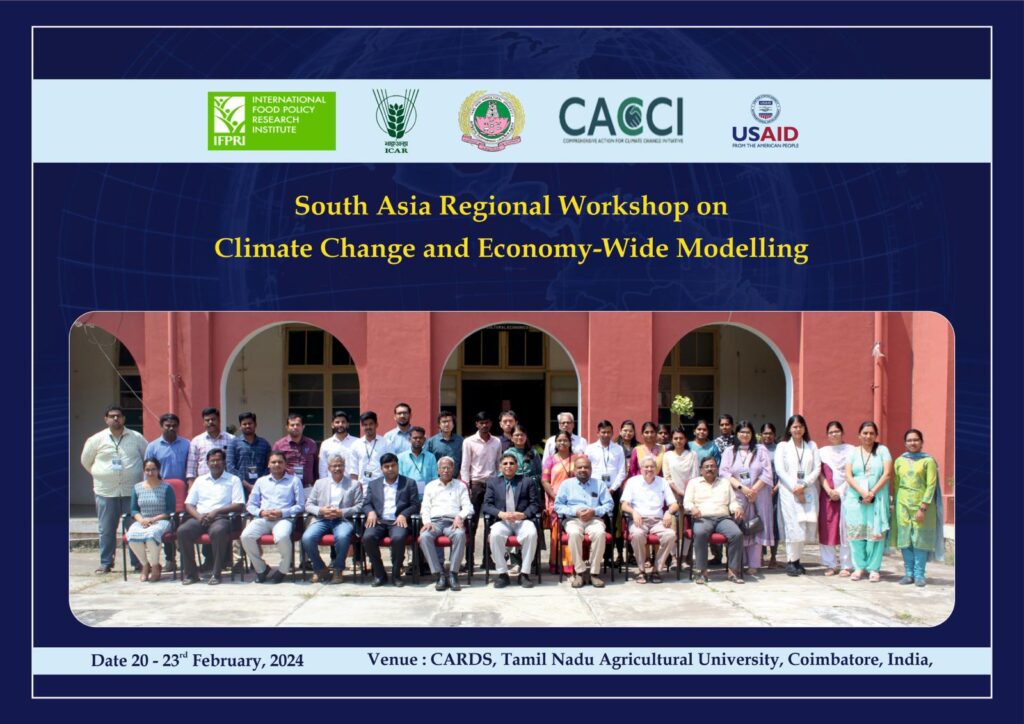
A four day South Asia Regional Workshop on “Climate Change and Economy-wide Modelling” was organized jointly by the Centre for Agricultural and Rural Development Studies (CARDS), TNAU, Coimbatore, Comprehensive Action for Climate Change Initiative (CACCI) and the International Food Policy Research Institute (IFPRI), Washington D.C., USA during 20-23 February 2024, The main objective of the workshop was to enhance participants' abilities to assess the impact of climate change on macroeconomic aspects of the agricultural sector and to plan strategies to adapt as well as mitigate climate and weather impacts, harmonize methods of analysis, and strengthen cooperation in these efforts to devise suitable policies at the national level pertaining to the climate change arena. A total of 30 participants from across states of India and Nepal attended in person. Around 10 participants from Bangladesh, Nepal and Sri Lanka participated online.
Dr. Barun Deb Pal, IFPRI, South Asia Office, New Delhi provided SAM modeling training to the participants as per the following agenda:
- Introduction to Economy-wide Analytical Framework:
- Overview of the economy-wide analytical framework as a tool for holistic economic analysis.
- Emphasis on understanding the interactions between different economic sectors, households, and the government.
- Introduction to the components of the framework, including input-output models, CGE models, and SAMs.
- Input-Output Models:
- Explanation of input-output models and their significance in analyzing inter-sectoral relationships.
- Discussion on how input-output models quantify the flow of goods and services between sectors and capture backward and forward linkages.
- Illustration of how input-output models can be used to assess the ripple effects of policy changes and external shocks on the economy.
- Computable General Equilibrium (CGE) Models:
- Introduction to CGE models as advanced tools for analyzing the equilibrium interactions between economic agents.
- Exploration of how CGE models incorporate consumer behavior, producer decisions, and market clearing mechanisms.
- Discussion on the application of CGE models in policy analysis, trade modeling, and forecasting.
- Social Accounting Matrix (SAM):
- Introduction to SAMs as comprehensive representations of an economy's socio-economic transactions.
- Explanation of the structure and components of SAMs, including income distribution, production, consumption, and savings.
- Emphasis on the role of SAMs in analyzing the distributional impacts of policies and shocks on different population groups.
- Policy Analysis and Scenario Modeling:
- Overview of policy analysis and scenario modeling using economy-wide analytical frameworks.
- Discussion on how these tools can inform policy decisions by assessing the potential impacts of alternative policy options.
- Illustration of scenario modeling techniques for analyzing the effects of policy interventions on key economic indicators.
- Data Requirements and Assumptions:
- Consideration of the data requirements and assumptions underlying economy-wide analytical models.
- Discussion on the challenges associated with data collection, parameter estimation, and model calibration.
- Emphasis on the importance of robust data and transparent assumptions for reliable model outcomes.
- Limitations and Challenges:
- Identification of the limitations and challenges inherent in economy-wide analytical frameworks.
- Discussion on issues such as model complexity, data limitations, and uncertainty in parameter estimation.
- Exploration of strategies for mitigating these challenges and enhancing the usefulness of analytical models in decision-making processes.
The workshop successfully brought together a diverse group of stakeholders to address the complex issues arising from climate change. The collaboration between TNAU, IFPRI, CGIAR, and CACCI created a synergistic platform for generating innovative solutions and fostering a collective commitment to building resilient and sustainable economies in the face of climate change. The outcomes of this workshop are anticipated to have a lasting impact on policies, research, and practices in the region. Participants expressed their learning experience in the four days workshop. The overall feedback was much positive, encouraging and extend to work on the thematic area in future.
To access the workshop material, click here.